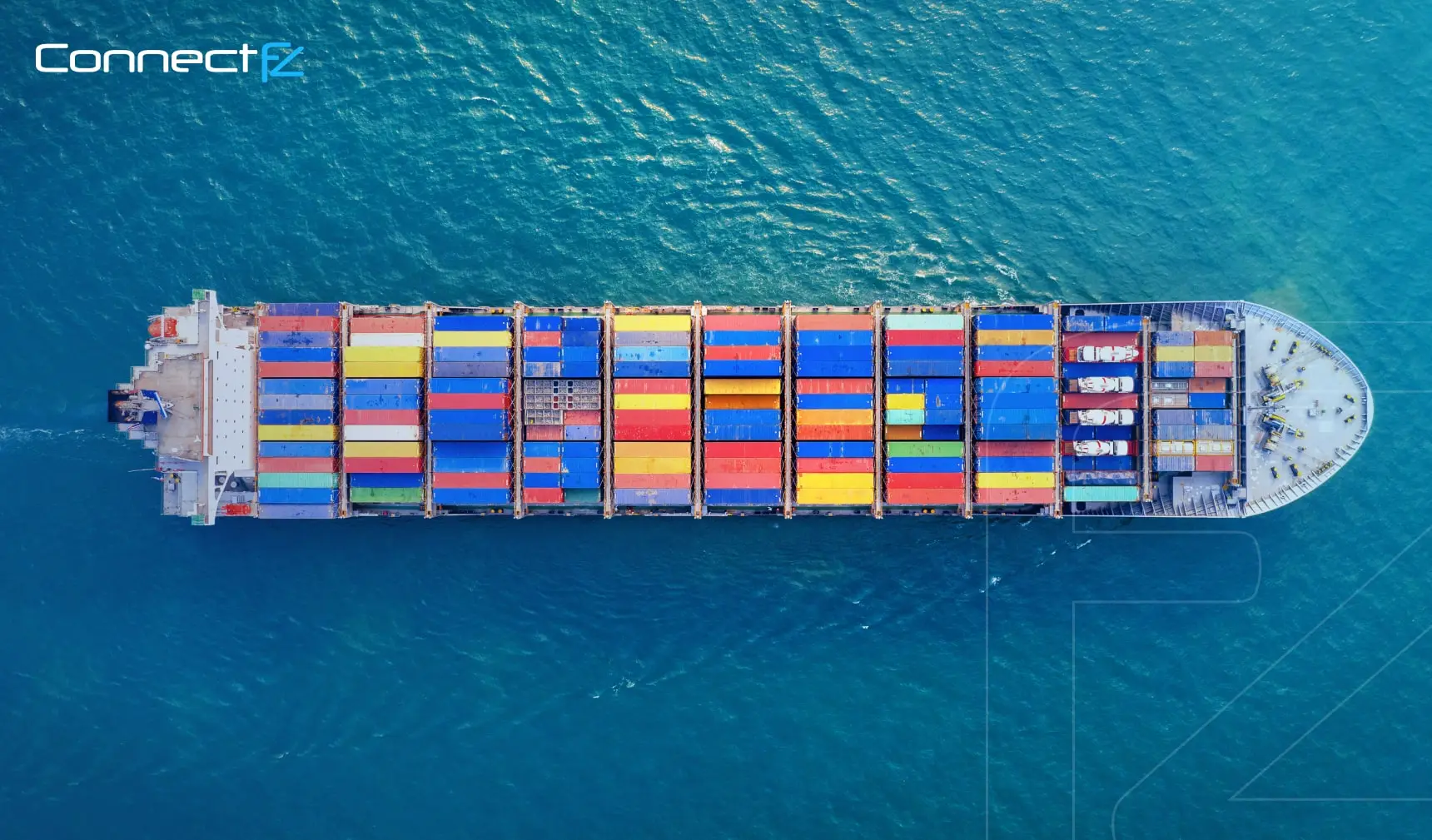The United Arab Emirates free zones, and especially the free zones in Dubai, provide a favorable environment for many different types of industries, including for those industries in which businesses depend on the export and import procedures. Know about this matter will help understand these processes and the importance they have in the UAE free zones in general.
In this article, you will learn everything you need to know related to export and import procedures in the Dubai and UAE free zones, their importance in the different industries which were established in these locations, and how to go through these procedures successfully to benefit your business. Let’s observe:
1. In a UAE free zone, What are the Export and Import Procedures?
Importing activities consist of bringing goods and products into the location where your company is established. On the other hand, exporting activities consist of sending these goods or services outside your location, in this case, outside the free zone you are established in. These activities must meet the UAE legal requirements in terms of licensing, permissions, and documentation.
It is important to have the required documents if your company employs export and import procedures within its usual business activities, and the most important one is a valid business trade license, which works for both importing and exporting goods. The trade license is issued by the UAE authorities and registered with the Customs Department.
Benefits of importing and exporting activities for a company.
In terms of trade, importing goods could mean purchasing services or products from another free zone or country. And regarding exporting them, it could be selling them to customers who are in another location. Both activities provide a lot of benefits to the company that employs these procedures, including the following ones:
- Exporting can increase your sales potential and profits exponentially, helping your company to expand its business regionally, internationally, and in the best scenario, globally. Your company will be able to discover new opportunities by sending its products and services abroad. This procedure is important to medium and large companies mostly since the businesses of these sizes have already reached the local market of the free zone in which they are located, and now they are looking forward to conquering new grounds.
- As for import procedures, you will surely obtain certain benefits, such as introducing new products to the market, providing high-quality goods and services, and becoming a leader in the industry. Importing can also help you reduce costs in the manufacturing area. It is possible since finding products and resources can be more affordable than producing them in the location you are in.
Importance of importing and exporting in the market.
These procedures are among the vital business activities that have helped many companies in the Dubai and UAE free zones to grow, expand, and compete on a global scale, increasing their success in the country. Both procedures are important for companies of all sizes, but it is mostly known that importing helps small and medium businesses to develop better until they are large enough to start exporting their products.
Therefore, import and export procedures in UAE have become essential elements to enter the market, develop better manufacturing systems, and make improvements to start reaching the company’s business goals by providing the benefits that were previously mentioned.
2. How do these procedures work in the United Arab Emirates?
Before applying export and import procedures in your company’s operations, it is important to know how these processes work and the regulations that must be followed in order to complete import and export activities, starting with the UAE and Dubai import regulations and export regulations.
Exporting and importing by sea.
In order to complete the sea imports process for FCL (full container load), the following steps must be followed:
- Receive the proforma invoice from the exporter, then pay LC opening charges to the bank.
- Advise LC opening to exporters banks, then submit the import declaration and pay customs charges outes.
- Issue the delivery order, surrender bill of landing (BOL), and pay charges.
- Pay bank and receive the documents, then approve and issue import declaration (bill of entry).
- Pay DP World charges, arrange and nominate the hauler.
- Discharge container from the vessel and generate e-token (full container cut).
- Receive full container from DP World to then proceed with the required inspection.
- After the inspection, transport the container to the importer’s warehouse and receive the container.
Regarding the sea export process for FCL, these are the steps that must be followed:
- Send proforma invoice to the importer and receive LC opening advice from the importer’s bank.
- Pay LC advising fee to exporter’s bank and request shipment booking.
- Request an empty container release and export acceptance from DP World, then issue the shipment booking confirmation.
- Pack goods, arrange and nominate the hauler, then generate e-token (empty out).
- Collect empty container from DP World and deliver to the exporter. Stuff goods into the container.
- Generate commercial invoice and packing list (optional). Submit the export declaration and pay customs charges, and approve and issue the export declaration.
- Pay DP World charges and generate e-token (export in).
- Deliver export full container to export yard and pay bill of landing (BOL) charges to shipment agent.
- Load container onto the vessel and issue the BOL to exporter. Then submit the documents to the bank.
- Verify and send the documents to importer’s bank and receive the payment from the bank.
Importing and exporting between a free zone and an onshore company.
You must be aware of the general provisions that are needed for importing into a free zone, which are:
- The importer must have a valid importer code from customs.
- Goods must conform to the business activity of the licensed firm.
- Goods should arrive in the free zone within 72 hours after the declaration is done.
- Goods should be inspected when entering the free zone.
- The free zone licensee must not alter, open, or dispense of the goods prior to their arrival in the free zone and customs endorsement.
Importing from a free zone into the UAE/GCC mainland.
The necessary documents that will be required to complete this process are the following ones:
- Delivery advice from the free zone company and stamped by the buyer and the seller.
- Classifications and free zone BOE reference number item-wise from the seller.
- Detailed invoice item-wise with its correct HS code.
- Packing list from the seller and import goods declaration form.
- Copies of the sellers’ and buyers’ trade licenses.
- No objection certificate from the competent authority, ministries, or departments (in case the goods are restricted).
- Online duty exemption approval from the relevant authorities, departments, or ministries.
- Request letter and application (in case the importer is exempted from paying customs duty)
Exporting and importing by air.
Export and import procedures by air must follow these steps:
- The exporter selects a freight forwarder or airline and places a transport order, while the exporter packages the goods for shipping.
- The freight forwarder picks up the goods from the exporter, along with the commercial invoice and other documents. If the case is different and the exporter deals directly with an airline, it should take the goods to the airline’s warehouse/storage area.
- The freight forwarder’s warehouse receives the goods and sends them to the airline’s storage area with the AWB.
- Either the freight forwarder or the exporter takes care of export customs clearance.
- The freight travels to its destination and the airline’s warehouse at the destination point notifies the freight forwarder or importer of the receipt of goods. After this, the airline completes the documentation and pre-notification of customs clearance.
- The freight forwarder picks up and checks the original shipment documents from the airline, then finalizes customs clearance and releases the goods.
- The freight forwarder delivers the goods to the importer.
Exporting and importing by road.
Export and import procedures by road can be done following these steps:
- The exporter selects a freight forwarder or haulage company and places a transport order.
- In the meantime, it packages the goods for shipping.
- The freight forwarder or haulage company picks up the goods from the exporter, along with the commercial invoice and other relevant documents. If the case is different and the exporter deals directly with the haulage company, it should take the goods to the haulage company’s warehouse/storage area.
- The freight forwarder or haulage company carries out customs clearance and delivers the goods to the importer.
3. For Exports and Imports, What Documents are Required?
The export and import procedures require specific documents. If you need to import products into the free zone, you will need these:
- The import goods declaration form.
- Delivery order from shipping or airline agent addressed to a licensed company in the free zone.
- Delivery note by the other free zone company confirming the acceptance of goods, products, or services. This is in case goods are moved by land or from other free zones.
- Import permit from the agencies in the free zones for restricted goods or products.
- A second copy of the bill of landing (if it is by sea), and the original airway bill (if it is by air), and road manifest (if it is a land shipment).
- Sale invoice from the free zone licensee addressed to a licensed importer in the country, which will be detailed the total quantity, currency, goods description, and total value.
- A detailed packing list as per weight, packaging method, among others.
These documents must be delivered to any of the customs centers, such as Dubai Customs at Jebel Ali, Port Rashid, Aweer Terminal, Cargo Village, or Airport Free Zone. The documents for export procedures are:
- Declaration of customs clearance.
- Instructions of the declaration of goods application or an approved export declaration certificate in the name of the licensed firm.
- The export permit from the customs for restricted goods, products, or services.
- Sale invoice showing the total quantity description and the details of each item.
4. Connectfz can help you Understand UAE free Zone Import and Export Procedures
When you start Freezone Business Setup in UAE, there are many elements and details that you must be aware of if you want to reach success in the country. With Connectfz support and services, you will be able to obtain more information regarding these matters and also the proper services to satisfy your business needs.
Contact us to learn more about our professional services and advice to boost your free zone company in no time, which will also help you a lot of money and other resources while making improvements in your company’s operations. Some of our services that could help you are our visa and government services, banking services, and many more.
Would you like to contact Connectfz to know more about import and export procedures in the Dubai and UAE free zones? If you have any question, do not hesitate to call us on +97143316688 or email us at info@connectfz.ae, and you will talk to one of our representatives that will gladly answer all of your questions.
Shak Malik Muhammad Rishad
![]() Shak Malik Muhammad RishadHe is an accomplished Business Development Executive with a strong background in driving revenue growth and fostering strategic partnerships. Known for his proactive approach and keen market insight, he excels in identifying new business opportunities, developing innovative strategies, and building long-lasting client relationships.
Shak Malik Muhammad RishadHe is an accomplished Business Development Executive with a strong background in driving revenue growth and fostering strategic partnerships. Known for his proactive approach and keen market insight, he excels in identifying new business opportunities, developing innovative strategies, and building long-lasting client relationships.

